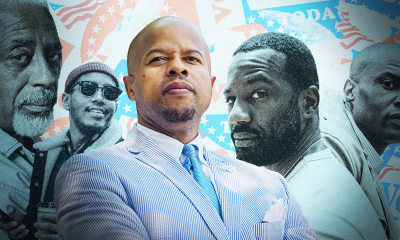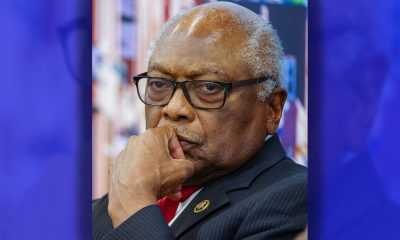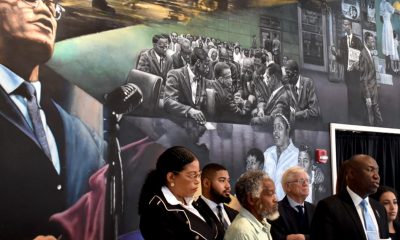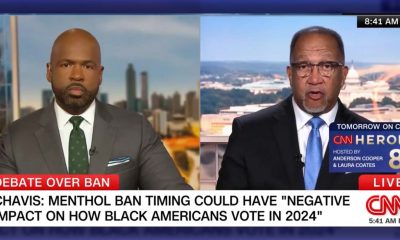Politics
Black Motorist’s Fatal Shooting: Outcry Over Police Tactics

In this April 4, 2015, frame from dashboard video provided by the North Charleston Police Department, Patrolman Michael Thomas Slager stands by Walter Lamer Scott’s car during a traffic stop in North Charleston, S.C. The video captures the moments leading up to a fatal shooting that has sparked outrage as the latest example of a white police officer killing an unarmed black man. Slager has been fired and charged with murder. (AP Photo/North Charleston Police Department)
JEFFREY COLLINS, Associated Press
MITCH WEISS, Associated Press
NORTH CHARLESTON, South Carolina (AP) — As its population surged in the last decade, South Carolina’s third-largest city fought rising crime through aggressive policing. But North Charleston’s police department lost the respect of many black residents in neighborhoods they blitzed, and now many are upset after the fatal shooting of an unarmed black motorist by a white officer.
Police in North Charleston used computers to track the neighborhoods where crime was on the rise, then sent waves of officers to patrol and conduct traffic stops, looking for offenders and letting drivers know they were cracking down. By the numbers, the tactics worked: every major category of crime, from murder to burglary to robbery to rape all fell significantly from 2007 to 2012, the last year for which statistics are available.
But anger is surfacing as civil rights leaders are demanding a full U.S. Justice Department investigation of the North Charleston force. The fatal shooting of Walter Scott as he fled after a traffic stop Saturday stirred outrage around the U.S., but people in North Charleston said they weren’t surprised.
“If the image of the city is more important than the lives of their citizens, there is going to be a problem,” said Dot Scott, president of the Charleston branch of the NAACP civil rights group. She’s unrelated to the slain motorist.
The U.S. Justice Department is conducting a parallel investigation with a local prosecutor into whether there were civil rights violations in the killing of Walter Scott. The NAACP would like that expanded to a full probe of whether racism and lack of respect for civil rights is pervasive through the entire department — similar to the federal agency’s probe after the fatal shooting of an 18-year-old unarmed black man by a white officer in Ferguson, Missouri.
With just over 100,000 people, North Charleston grew by nearly 16,500 people or about 20 percent from 2000 to 2010. More than half of its residents are minorities, mostly African-Americans. About 28 percent of its families make less than $25,000 a year.
For years, it battled an economic slump caused by the mid-1990s closing of the Charleston Naval Base on the city’s waterfront. For decades, city fortunes were tied to the base, where 38,000 people worked in the late 1980s.
But the city had plenty of land and proximity to next door Charleston, an affluent city popular with tourists. North Charleston has since bounced back, largely because of a huge investment by Boeing, which has a 787 aircraft manufacturing plant in the city.
Now North Charleston reaches from upscale subdivisions of $700,000 homes near the banks of the Ashley River to the older, impoverished black neighborhoods near the old naval base.
And those poor and black residents have learned to band together and be cautious around a police force that is nearly 80 percent white. Several residents around the city this week told the same story about what they do when an officer turns on the lights to pull them over. They said they immediately call a friend to see if they are nearby and can walk over to be a witness to a traffic stop. If no one is close, the phone is kept on so the person on the other end can listen, just in case.
Blacks were routinely putting their hands in the air when police confronted them for years before “Hands up, Don’t shoot” became a slogan in the wake of the death of Michael Brown in Ferguson, said 25-year-old Robert Blanton.
He said he has been stopped plenty of times for simply walking around his neighborhood after dark.
“I wonder — do they do that to whites walking in their neighborhood?” Blanton said.
The police department has refused to talk about its crime-fighting strategies since Scott was killed and officer Michael Slager was charged with murder, saying they want to wait until after Scott’s funeral on Saturday out of respect for his family.
But in a 2012 article in The Post and Courier of Charleston, then-Police Chief Jon Zumalt justified his more aggressive approach by saying it ensured people were obeying the law. And even if traffic stops didn’t lead to arrests, it got the word out that North Charleston was serious about fighting crime, he told the newspaper, which reported traffic stops in the city increased by about 3,000 to nearly 64,000 in 2011.
Numbers gathered by the state back that up. North Charleston had 26 murders in 2007 and 13 murders in 2012. The number of robberies in that five-year span fell 66 percent, while the number of burglaries dropped 29 percent.
Copyright 2015 The Associated Press. All rights reserved. This material may not be published, broadcast, rewritten or redistributed.
Activism
Barbara Lee Launches Campaign for Mayor of Oakland
“At this critical moment, we must not be a city divided, but a community united,” she Lee. “If elected I will bring my hands-on leadership, new ideas and decades of experience in identifying billions in resources for our great city, so all residents and businesses are stronger and safer and our community has optimism and confidence in Oakland’s future.”

By Post Staff
Barbara Lee on Wednesday morning formally announced her candidacy for Mayor in Oakland’s April 15 special election.
“Time and time again, Oaklanders have faced our toughest obstacles by uniting to meet our challenges,” said Lee.
“At this critical moment, we must not be a city divided but a community united,” she said. “If elected, I will bring my hands-on leadership, new ideas, and decades of experience in identifying billions in resources for our great city so all residents and businesses are stronger and safer and our community has optimism and confidence in Oakland’s future.”
“As Mayor, I’ll address our homelessness crisis, prioritize comprehensive public safety and mental health services, and lead with fiscal responsibility to deliver the core City services residents and business owners deserve. Let’s do this – together.”
“I’ve never shied away from a challenge,” said Lee. “I’m always ready to fight for Oakland.”
Watch her campaign video here, which is online at BarbaraLee4Oakland.com
Activism
Who Wants to Be the Next Elected Mayor of Oakland?
The Oakland Post is issuing a CALL to all candidates to present their answers, plans, or solutions in response to our list of questions.

By Paul Cobb
Many of you probably recall the oft-repeated expression when describing leadership that “many are called but few are chosen.” We will be inundated during January with many claims of qualifications by those who want to lead Oakland.
As of Jan. 1, 2025, we have heard the names of 14 potential candidates who might become Oakland’s next Mayor.
The Oakland Post is issuing a CALL to all candidates to present their answers, plans, or solutions in response to our list of questions.
Any candidate who wishes to receive a free announcement, publicity or space in the paper must submit solutions.
- The first questions we propose are 1) What is your budget balancing plan?
- What is your position on requiring all city employees to work full-time in their designated offices rather than remotely from their homes?
- What is your plan to provide open-access opportunities to all police officers for overtime pay?
- Since many businesses, especially downtown, have closed, what is your plan to attract and increase revenues?
Please send your submissions of 300 words or less to each question to Social@postnewsgroup.com or visit www.postnewsgroup.com
Activism
Oakland NAACP President Stands on the Frontlines for Equity
With education as a cornerstone, Adams emphasized the importance of youth having access to quality kindergarten through 12th-grade education along with college or vocational programming beyond high school. “I feel that it’s so important for our children to get a good education in K-12th grade, along with the colleges of their choice, especially with the HBCU’s (Historically Black Colleges and Universities).”
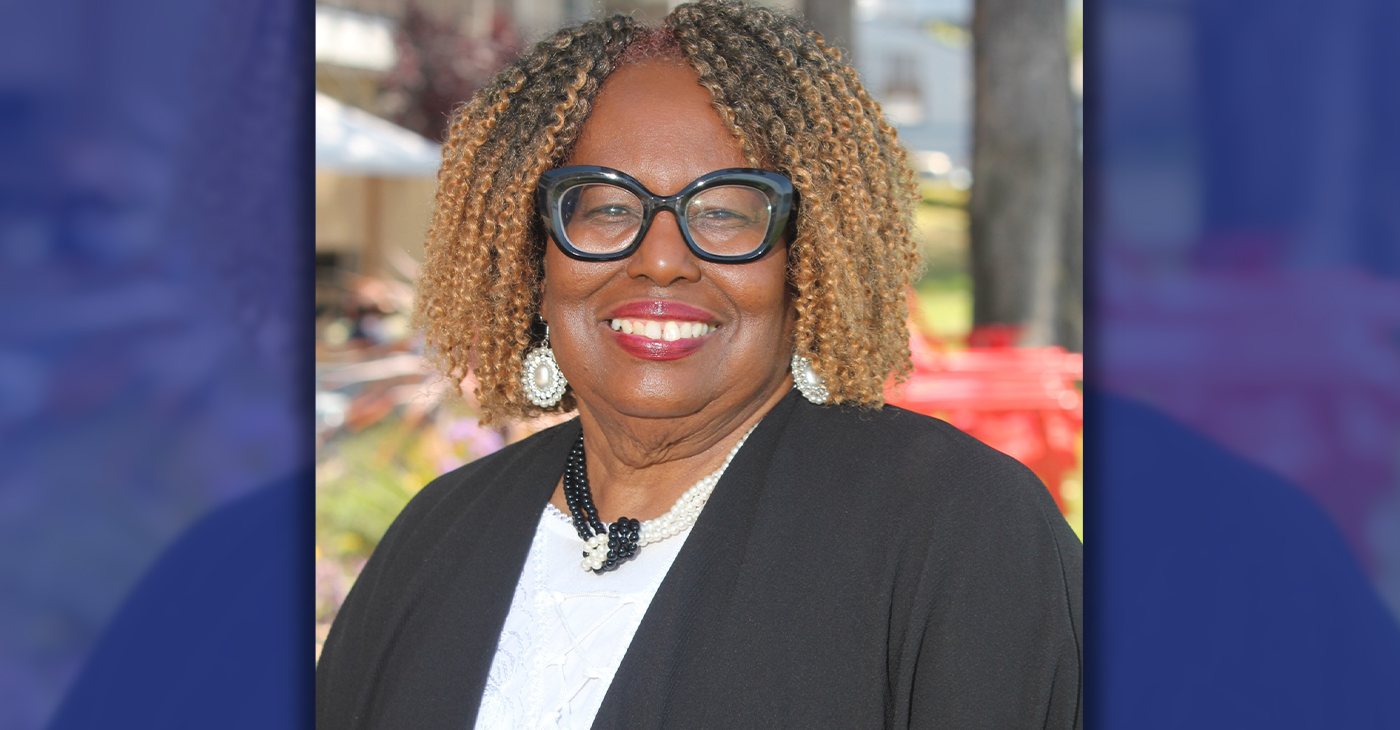
By Carla Thomas
For Cynthia Adams, president of the Oakland chapter of the NAACP, fighting for the rights of Black people comes naturally. With southern roots in Arkansas, Adams experienced firsthand the injustice and unfairness of racism.
“Growing up in the Jim Crow South, I experienced the unfair treatment of people of color and how faith can inspire communities to bring about positive and long-lasting change,” said Adams. Adams says a combination of her family and faith has kept her strong in the face of adversity and inspired her life’s work of advocacy.
Adams chose education as a career path — and a means to achieve equity and overcome racism. She earned her bachelor’s degree at the University of Arkansas at Pine Bluff and later received an advanced degree from California State East Bay.
Adams’ experience as an Oakland Unified School District (OUSD) recorder, a counselor, a researcher, and a college recruiter has allowed her to be laser-focused on youth. She also served as the chairperson for the Oakland NAACP youth.
“The mission of the National Association for the Advancement of Colored People is to ensure the political, educational, social, and economic equality of rights of all persons and to eliminate race-based discrimination. We want to ensure our citizens have equal rights and opportunities without discrimination based on race.”
As a partner with the State of California’s Stop the Hate campaign, Adams says the initiative is a step in the right direction. “It’s great that our governor and state created the Stop the Hate campaign and provides resources for victims of racism and other hate crimes,” said Adams. “The racism toward Black people has increased and our children are being targeted,” she continued.
“We, at the Oakland branch, created a declaration on racism that will amplify the needs of our community to combat racism,” continued Adams. “That declaration was adopted nationally.”
Bridging communities and collaborating is also a strategy for moving society toward justice, according to Adams.
“Through the NAACP, we build connections between communities and advocate for the rights of historically marginalized and oppressed individuals,” said Adams. “Collective action is the only way to advance civil rights and promote social equity.”
With education as a cornerstone, Adams emphasized the importance of youth having access to quality kindergarten through 12th-grade education along with college or vocational programming beyond high school. “I feel that it’s so important for our children to get a good education in K-12th grade, along with the colleges of their choice, especially with the HBCU’s (Historically Black Colleges and Universities).”
By taking stands on supporting former Oakland Police Chief LeRonne Armstrong to supporting the recall of a mayor faced with a scandal that brought negative national press to the city of Oakland, Adams has always demanded more for her people, and better for Oakland, the city she calls home.
She expressed pride in the national organization’s announcement of a $200 million fund designed to empower Black funders nationwide. “We all know the health of a community begins with economics,” said Adams.
Adams says that strengthening Black businesses automatically sustains a community. “We’ve also got to educate our community on opportunities and teach our children critical thinking so that they can provide the next generation of solutions for society,” said Adams.
-

 Activism3 weeks ago
Activism3 weeks agoBooks for Ghana
-

 Arts and Culture4 weeks ago
Arts and Culture4 weeks agoPromise Marks Performs Songs of Etta James in One-Woman Show, “A Sunday Kind of Love” at the Black Repertory Theater in Berkeley
-

 Bay Area3 weeks ago
Bay Area3 weeks agoGlydways Breaking Ground on 14-Acre Demonstration Facility at Hilltop Mall
-

 Activism4 weeks ago
Activism4 weeks ago‘Donald Trump Is Not a God:’ Rep. Bennie Thompson Blasts Trump’s Call to Jail Him
-

 Activism3 weeks ago
Activism3 weeks agoLiving His Legacy: The Late Oscar Wright’s “Village” Vows to Inherit Activist’s Commitment to Education
-

 Alameda County3 weeks ago
Alameda County3 weeks agoAC Transit Holiday Bus Offering Free Rides Since 1963
-

 Activism4 weeks ago
Activism4 weeks agoOakland Post: Week of December 11 – 17, 2024
-

 #NNPA BlackPress4 weeks ago
#NNPA BlackPress4 weeks agoCalifornia, Districts Try to Recruit and Retain Black Teachers; Advocates Say More Should Be Done






